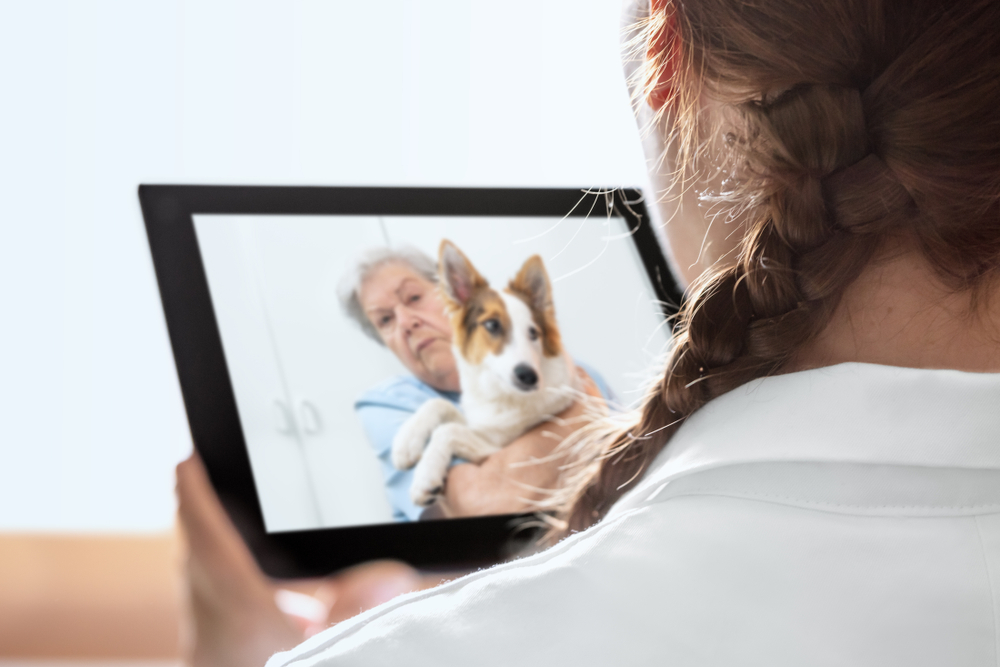What to Expect With a Virtual Vet Visit? A Vet-Approved Guide

The COVID-19 pandemic changed the world in many ways, both negative and positive. One of the positive things to come out of lockdowns was the expansion of virtual health care options. We can now visit nearly any member of our healthcare team from the comfort of our own home, and this extends to our furry family members, too.
Virtual veterinary care is a convenient option for pet owners looking for advice, health tips, and more. However, it can be nerve-wracking to go into your first virtual vet visit blind. That’s why we put together this guide to provide some insight into how virtual veterinary care works and what you should expect during your first “visit”. Read on to learn more.


How Does It Work?
In general terms a virtual vet visit involves contacting a veterinarian through an online platform from the comfort of your own home. Virtual vet visits operate differently depending on your provider. Some are free, others require a fee per visit, and some providers even offer a membership or subscription plan.
Your virtual visit will connect you with a licensed veterinarian remotely, whether it be through phone calls, emails, live chat, or video calls.


What Services are on Offer?
The services that are available generally fall under the following categories:
- Telemedicine requires you and your pet to have a pre-existing in person relationship with a veterinarian, they may then be able to prescribe medication and give a diagnosis (this is state and country dependent).
- Teletriage/Teleadvice is available if you have not met a veterinarian with your pet in person and therefore do not have an active Veterinarian Client Pet Relationship (VCPR). Again, depending on state regulations, it is likely that the veterinarian you contact will be able to provide general advice, opinion and education but not make diagnosis or prescribe medication.
It is important to have realistic expectations of what can be provided by a virtual vet visit and to understand that the veterinarians involved are regulated and must follow laws and regulations on the type of service they can offer you.
What Are the Different Types of Virtual Vet Visits?
As you can imagine, virtual veterinary visits are not suitable for every situation. Let’s look at a few types of appointments that would qualify.
Qualifying visits would include things like check-ups, follow-ups, and advising sessions. Virtual vets can offer general advice regarding nutrition, sterilization, surgical procedures, vaccinations, parasite prevention, and more.
They can offer teletriage services to help you determine whether your pet’s current situation is an emergency that requires immediate attention at your regular veterinary clinic or if it’s more of a “wait and see” type of situation.
However, because they’re not able to physically examine your pet, they can usually only provide their opinion on the clinical signs your pet may be exhibiting but they may be regulated not to give a diagnosis. Diagnosis of illness in most states and countries is not allowed on the basis of a virtual consultation alone.


When Is It Not Recommended to Make a Virtual Vet Visit?
A virtual vet visit is not recommended in emergency or serious illness situations. Contact your regular veterinarian or out of hours clinic in the first instance. The only variation to this is if your insurance provider states you must contact their veterinary service first, before financial assistance is given.
There are limitations to what a vet can accomplish virtually. While they can provide peace of mind and ease stress for pet owners who are concerned about their animal’s health, there are many situations where you must seek in-person veterinary care.
This can include circumstances such as:
- Trauma (road traffic accidents or fight wounds)
- Gastrointestinal issues (e.g., vomiting or diarrhea)
- Not eating for over 24 hours
- Inability to urinate
- Bleeding
- Seizures
- Paralysis
- Difficulty breathing
- Limping
- Injuries and accidents
- Eye trauma
- Difficult or prolonged labor in a pregnant pet
- Bloated abdomen
Advantages and Disadvantages of Virtual Veterinary Visits
Advantages:
- Convenience. Getting a sick pet to the vet can feel impossible to manage. And, if the pet owner has mobility issues or is sick themselves, going to the vet may very well be out of the question.
- Reduced stress. For some pets, a car ride or clinic visit can be an extremely traumatic experience. A virtual visit means you can speak to a vet from the comfort of your own home and not worry about putting undue stress on your pet.
- Cost-effective. It’s no secret that veterinary care is expensive, it has to be, to deliver quality care. While you’ll still need to pay for a virtual vet visit, it’s most often more affordable than in-person consults.
Disadvantages:
- No physical examination. A virtual vet can’t conduct a hands-on physical examination of your pet. While a video call can offer some clues to your pet’s overall health, your vet interprets physical findings in a hands-on examination for the diagnosis of most illnesses.
- Potential for additional costs. While virtual vet visits are typically cheaper initially than in-person consults, if the vet deems your pet’s situation requires a visit to a veterinary clinic, you could wind up paying more in the long run, as you will have paid two consultation fees.
- No diagnostics. Because our pets can’t talk to us, veterinarians rely a lot on diagnostic testing to determine what’s wrong with them when they’re sick. Specialized testing cannot be done virtually.




Frequently Asked Questions
What will I need to have on hand before my virtual vet visit?
While virtual vet visits are great for their convenience and simplicity, you should still make some preparations before your first appointment.
- You must be in an area with a stable internet connection. The last thing you want is to be charged for a visit with a virtual vet that you weren’t able to even call in to.
- Find a quiet, distraction-free area of your home so you and your vet can hear each other well.
- Compiling a list of questions in advance ensures you’ll have all your concerns addressed during your call.
- Your pet should be nearby, so if the vet decides they need to see them to provide advice, you won’t have to go running around your home to find them.
- Finally, make sure your pet’s medical information is close by, updated, and accurate.
Can a vet prescribe medication during virtual visits?
Sometimes medications can be prescribed to your pet after your virtual visit. Moreover, many vets work closely with online pharmacies that can mail your pet’s prescription right to your door. However, it’s essential to understand that not all online services can prescribe medications. State Veterinary Practice Acts will dictate whether a vet can give a diagnosis and prescribe medications, so you may want to do some research specific to your location.


What will happen during my virtual vet visit?
Your vet will begin by asking about your pet’s health, health history, behavior, and any signs they may exhibit. They may require you to perform tasks like examining their eyes or ears.
You need to provide as much information about your pet as possible. If you have any photos or videos that concern your pet’s health, you may be asked to share them.
Can anyone make a virtual vet visit?
Depending on where you live, virtual veterinary care may require an existing, in-person veterinarian-client-patient relationship (VCPR). This is where the veterinarian has met both you and your pet and examined the pet. They will gather information such as the weight of your pet that is needed for safely prescribing medications.
The regulations are different in most states and countries around the world. For example, you no longer need an established VCPR in most Canadian provinces to see an online vet. These providers allow pet owners to forge a virtual VCPR via video consultation.
Each U.S. state will have its own laws regarding VCPRs. For example, in Oklahoma, vets can use their own discretion to determine if a VCPR needs to be established in person or if it can be done remotely. However, they cannot prescribe medication unless the relationship is first established in person.
However, in most cases, virtual vets can still offer general advice, first aid recommendations, and triage patients without a VCPR.


Conclusion
Virtual vet visits have their place in veterinary care but aren’t suitable for every situation. In most cases they should be seen as supplemental to in clinic services and we still recommend making sure your pet is registered with a local veterinarian.
They’re beneficial for pet owners whose animals aren’t experiencing an emergency and those needing preventative care advice or are unsure how urgently their pet needs to be seen.
If you’re interested in exploring your options for virtual veterinary care, check your local laws first. This will give you realistic expectations and ensure you understand what your virtual vet legally can and cannot do.
Featured Image Credit: Miriam Doerr Martin Frommherz,



